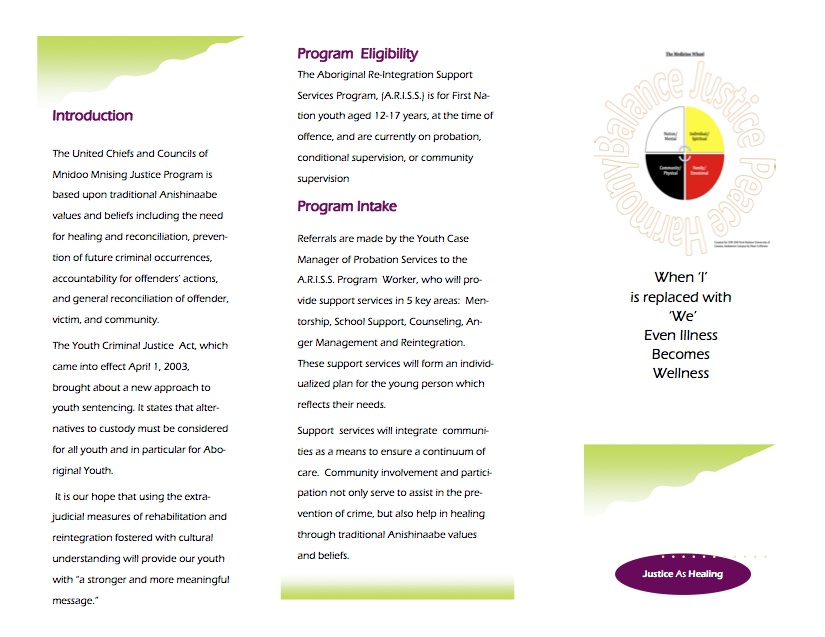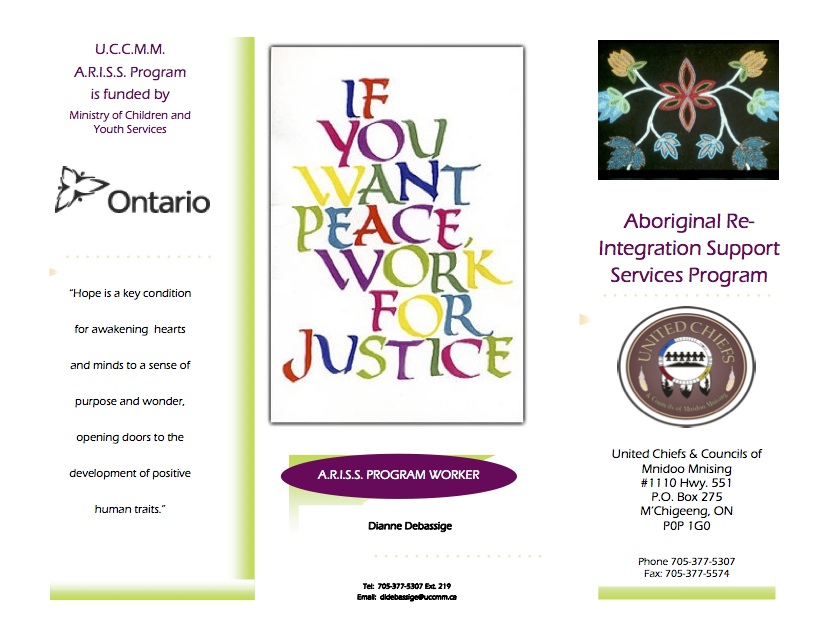Indigenous Reintegration and Supportive Services (IRSS) Program
The Indigenous Re-integration Support Services Program provides support to the Youth Case Manager, Manitoulin Youth Justice Services with respect to Aboriginal young persons aged 12-17, at the time of the offence, who have been found guilty and are currently on Probation, conditional supervision or community supervision. Support will be provided in the following 5 areas in order to help youth on Probation fulfill the requirements of their Probation Order, or as directed by their Probation officer and in doing so, lead more positive and healthy lives.
o Mentorship: Build a positive, trusting relationship with the youth by attending all scheduled meetings, or when that is not possible, telling the youth in advance; focus on the youth’s needs and look to improve the youth’s prospects while respecting his/her life circumstances and perspectives; consider the youth’s need for fun, and extra-curricular activities, i.e. art, sports, music; get to know the youth’s family without getting over involved. The ARISS worker and youth will decide where and when the activities will take place, (may take various positive forms i.e. game playing, going to sports, entertainment, cultural or recreational events). The ARISS worker should meet with a youth at least 1.5 hours per week.
o Anger Management: Locate anger management programs that are geared to youth. Assist youth with registering and attending the sessions.
o Community Service Hours: Assist the youth with securing meaningful community service placements, ensuring completed reports get signed and submitted to the Youth Case Manager.
o School Support: Assist the youth to stay in school by identifying why he/she has difficulty attending, or staying in school. Liaise with the school counselor to discuss any issues the youth may be facing.
o Re-integration Support: Attend discharge meetings with the Youth Case Manager. Assist youth released from secure custody with re-integration into the community by increasing the youth’s awareness of educational, cultural, recreational and career opportunities, focus on helping the youth accept their responsibilities and realize their potential, and assist the youth in transitioning out of the custodial setting.
o Mentorship: Build a positive, trusting relationship with the youth by attending all scheduled meetings, or when that is not possible, telling the youth in advance; focus on the youth’s needs and look to improve the youth’s prospects while respecting his/her life circumstances and perspectives; consider the youth’s need for fun, and extra-curricular activities, i.e. art, sports, music; get to know the youth’s family without getting over involved. The ARISS worker and youth will decide where and when the activities will take place, (may take various positive forms i.e. game playing, going to sports, entertainment, cultural or recreational events). The ARISS worker should meet with a youth at least 1.5 hours per week.
o Anger Management: Locate anger management programs that are geared to youth. Assist youth with registering and attending the sessions.
o Community Service Hours: Assist the youth with securing meaningful community service placements, ensuring completed reports get signed and submitted to the Youth Case Manager.
o School Support: Assist the youth to stay in school by identifying why he/she has difficulty attending, or staying in school. Liaise with the school counselor to discuss any issues the youth may be facing.
o Re-integration Support: Attend discharge meetings with the Youth Case Manager. Assist youth released from secure custody with re-integration into the community by increasing the youth’s awareness of educational, cultural, recreational and career opportunities, focus on helping the youth accept their responsibilities and realize their potential, and assist the youth in transitioning out of the custodial setting.
| ariss_promo_poster.jpg |


